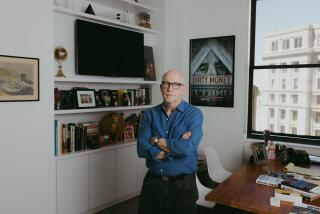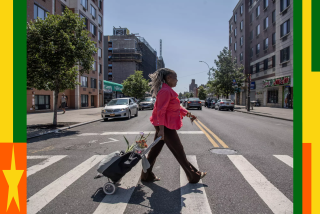Review: ‘Under African Skies’ revisits Paul Simon’s ‘Graceland’
- Share via
When Paul Simon’s seminal album “Graceland” landed in 1986 with its intoxicating African rhythms and critical acclaim, it also came tainted by the apartheid controversy already swirling around it. The excellent new documentary “Under African Skies” comes along like a bridge over those troubled waters, following Simon back to South Africa last summer for a 25-year reunion concert with the musicians who made the album and a sit-down with one of his chief anti-apartheid critics.
With a moving intimacy and consistent candor, the film is a satisfying blend of insight and entertainment as it examines the artistry and the politics of the Grammy-winning album, which stands among Simon’s best work. The themes are in the sure hands of veteran documentary filmmaker Joe Berlinger, whose work has included parsing the Ecuadorean contamination suit against Chevron in 2009’s “Crude” and the soul-searching shrink sessions with the metal band in 2004’s “Metallica: Some Kind of Monster” (co-directed with Bruce Sinofsky).
Though it is anything but a concert film, many of the infectious hooks from the album are stitched throughout — “Diamonds on the Soles of Her Shoes,” “Homeless,” “Graceland,” and a clip of the song that would give the documentary its name, “Under African Skies,” culled from concert footage featuring Simon and Miriam Makeba, who has since died. The recording process, the lyrics and the distinctive sound become, in a sense, effective talking points.
There are the expected interviews with other artists about “Graceland’s” impact and influence, including Quincy Jones, Paul McCartney, artist-activist Harry Belafonte and the new generation represented by Vampire Weekend. But more interesting is the fly-on-the-wall view of the creative process itself, thanks to footage of the recording sessions when Simon first traveled to Johannesburg in 1985 and months later when he brought the musicians to New York and London as he was finishing the album.
One of the documentary’s most compelling segments is when Simon for the first time faces Dali Tambo of Artists Against Apartheid, who insisted at the time that Simon should never have come to the country during the boycott or involved South African musicians in the project. The result is a gripping conversation that brings some measure of closure if not resolution.
The sense that Simon was content to let the cards fall where they may can be felt throughout the film, particularly as it becomes clear just how hurt by the criticism he remains. Certainly the musician is given plenty of room to make his case, but the opposition is as well, primarily through the erudite arguments made by Tambo. There is a good deal of historical context woven in, much of it coming from news footage of the time. F.W. de Klerk was still president of South Africa, Nelson Mandela was still imprisoned, and there were bloody riots in the streets — it feels a lifetime ago watching it now.
The footage shot of the recording sessions as the music of “Graceland” actually took shape is a remarkable bit of unseen history. Watching the musicians and Simon as they experiment with the township jive sound that would come to define “Graceland” makes it clear just how collaborative the process was. That is intercut with footage Berlinger shot last year as the now-gray musicians reunited and rehearsed for the anniversary concert in Johannesburg last July.
The affection between the musicians and Simon is clear. The portrait that emerges time and again is personal and a reflection of the realities of apartheid. Particularly touching is Joseph Shabalala of the a cappella group Ladysmith Black Mambazo, so unforgettable in their”Saturday Night Live”performance with Simon before the album was released. Shabalala remembers hugging Simon at one point during their initial 1985 collaboration, the first white person he had ever embraced.
Whether Simon was right to go to South Africa is left for the audience to decide, though the film does note that he was the first artist Mandela invited to perform when the boycott ended. Like most complex political situations, particularly when human rights are on the line, there is no easy answer. But hearing the stories of those involved in “Graceland,” watching the invention of the music, and hearing once again the songs, it’s hard to imagine what it would be like not having it around.
More to Read
The biggest entertainment stories
Get our big stories about Hollywood, film, television, music, arts, culture and more right in your inbox as soon as they publish.
You may occasionally receive promotional content from the Los Angeles Times.











